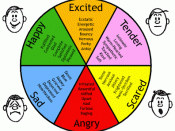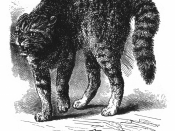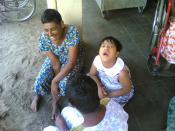With Mr. Gradgrind's philosophy on fact and fancy; fact is the only thing useful for a child and "nothing else will ever be of any service to them" (pg. 9) while dismissing any development of their emotions as well as imaginations, clearly depicts Dicken's theme of human mechanization. In the first sections of the novel, particularly in "Book the First: Sowing": Chapter 2, human beings being portrayed as machines is clearly portrayed as Dickens describes Louisa and Thomas looking thorough a peephole at the circus. "Dumb with amazement, Mr. Gradgrind crossed to the spot where his family was thus disgraced, laid his hand upon each erring child, and said: 'Louisa!! Thomas!!' Both rose, red and disconcerted. But, Louisa looked at her father with more boldness than Thomas did. Indeed, Thomas did not look at him, but have himself up to be taken home like a machine" (pgs. 18-19). Thomas is clearly depicted of not possessing any emotions and personality for that matter, just like a machine.
Hard Times portrays what the world would be like if children were not children at all but clearly machines. With no excitements, compassions, and emotions, all their humanistic characteristics are taken away from them, thus making their lives unbearable.
In "Book the Second: Reaping": Chapter 11, as Harthouse confesses his true feelings to Louisa and Louisa asks him to meet her in town later. However, as we find in Chapter 12, she does not go to see Harthouse but goes to Stone Lodge instead as she clearly states to her father on page 208, "How could you give me lie, and take from me all the inappreciable things that raise it from the state of conscious death? Where are the graces of my soul? Where are the sentiment of my heart? What have...


